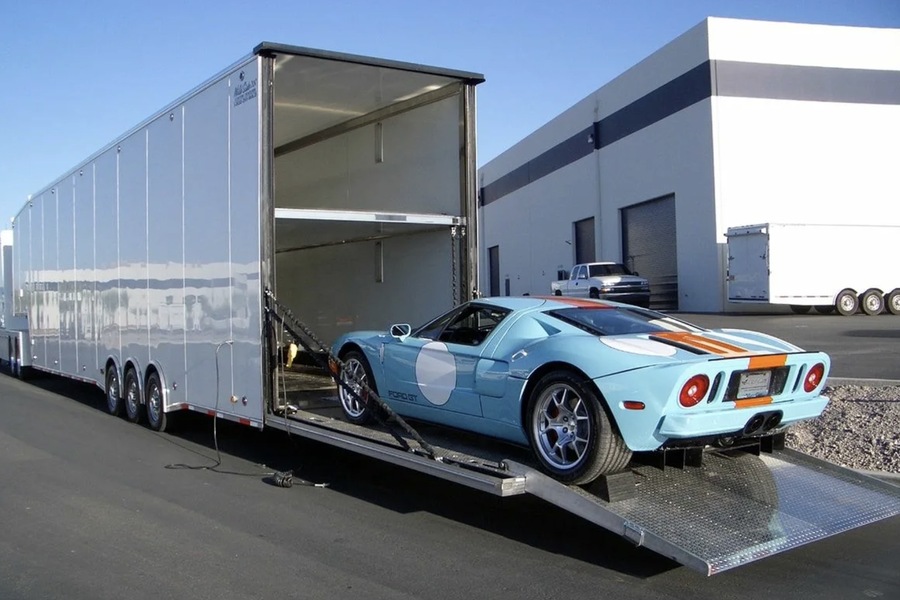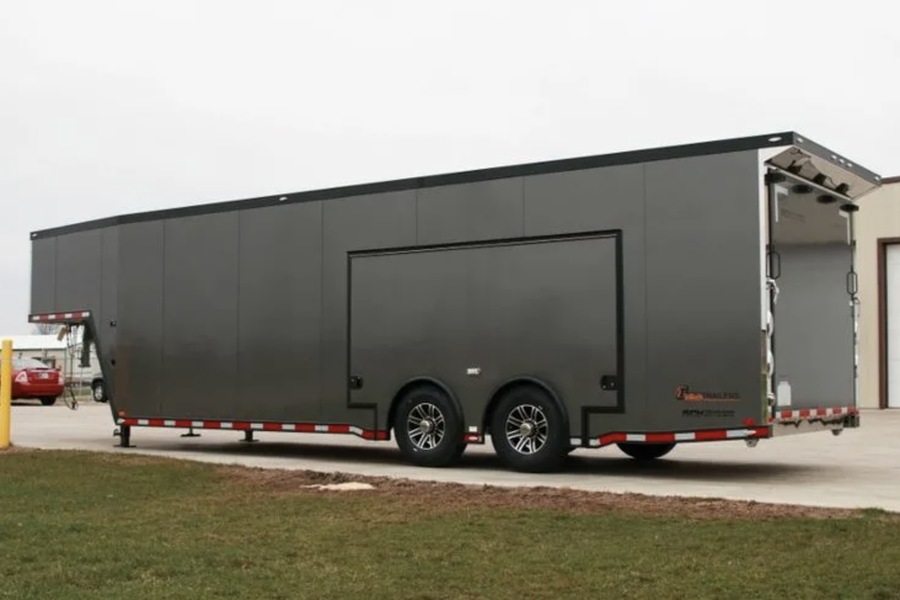Car trailers are indispensable tools in the world of transportation, offering a practical solution for carrying goods of all sizes and types. Whether for personal use, industrial purposes, or commercial applications, trailers allow vehicles to expand their cargo capacity significantly, enabling the efficient movement of goods over short or long distances. In this detailed guide, we will explore the intricacies of car trailers, including their types, purposes, unique features, and the rules for their safe operation. Additionally, we will discuss the distinctions between trailers and semi-trailers and provide insights into modern trailer rental services, such as those offered by Safest Lift, a trusted name in trailer rentals and lifting solutions.
Car Trailers vs. Semi-Trailers: Key Differences
Understanding the difference between trailers and semi-trailers is crucial, as each type serves specific purposes and operates differently.
Trailers
Design: Equipped with their own wheel axles, trailers can stand independently when not connected to a towing vehicle.
Advantages: They are versatile and suitable for various types of cargo.
Limitations: Trailers can impose an uneven load on the towing vehicle, which may affect handling, stability, and tire wear.
Semi-Trailers
Design: These are partially supported by the towing vehicle, as they lack front wheels and rely on a coupling device, often called a saddle.
Advantages: They ensure even load distribution, reducing wear on tires and improving overall vehicle handling.
Limitations: They are primarily used for heavier and bulkier cargo, requiring specialized vehicles for towing.
Both options have their strengths and weaknesses, making it essential to select the right type based on the specific transportation needs.
Types of Car Trailers
Car trailers are designed for various purposes, with each type tailored to specific kinds of cargo. Below is an expanded breakdown of the major types:
1. Cargo Trailers
Cargo trailers are the most commonly used type and are known for their versatility.
Features
-Can be open (flatbeds) or enclosed (box-style) for added protection.
-Available in single or double-axle configurations, depending on load capacity.
Applications
-Ideal for transporting furniture, construction materials, appliances, and other general goods.
-Widely used by movers, contractors, and delivery services.
2. Vehicle Trailers
Vehicle trailers are specialized for transporting automobiles and other modes of transport.
Features
-Equipped with ramps, hydraulic lifts, or winches to facilitate loading and unloading.
-Some models include locking mechanisms to secure vehicles during transit.

Applications
Used for moving cars, motorcycles, ATVs, boats, and even small planes.
3. Box Trailers
Box trailers provide an enclosed space for transporting sensitive or high-value cargo.
Features
-Robust walls and weatherproofing ensure protection against external elements.
-Options for climate control and internal security features.
Applications
Used to transport electronics, medical supplies, food items, or fragile goods that need added security and protection.
4. Agricultural Trailers
Designed specifically for the agricultural sector, these trailers are indispensable for farming activities.
Features
-Large, durable frames capable of carrying heavy loads.
-Optional compartments for transporting livestock or fragile produce.
Applications
Used to haul fruits, vegetables, grain, farming equipment, or animals to markets or storage facilities.
Specialized Trailers and Semi-Trailers
For industries requiring specific transportation solutions, specialized trailers and semi-trailers are available:
Flatbed Trailers
Flatbed trailers are open platforms with no walls, making them ideal for oversized and irregularly shaped cargo.
Applications: Commonly used for transporting construction equipment, building materials, and other large items.
Awning Trailers
These trailers feature a protective cover, offering partial or full enclosure.
Applications: Suitable for goods that require protection from dust, sunlight, or rain, such as textiles or machinery.
Refrigerated Trailers
Equipped with refrigeration units, these trailers maintain a specific temperature to preserve perishable items.
Applications: Essential for transporting fresh produce, dairy products, meat, and pharmaceuticals.
Isothermal Trailers
These trailers have insulated walls designed to maintain a consistent internal temperature.
Applications: Used for items that require controlled environmental conditions, such as chemicals or fine wines.
Dump Trailers
Dump trailers come with a hydraulic mechanism for tilting the bed, making unloading bulk materials quick and efficient.
Applications: Used for transporting and unloading gravel, sand, or agricultural produce.
Tank Trailers
Tank trailers are built for carrying liquid, gaseous, or granular cargo.
Applications: Common in industries handling oil, chemicals, or water transportation.
Low-Deck Trailers
These trailers have a lower base height, facilitating the transportation of heavy machinery and vehicles.
Applications: Preferred for transporting agricultural or industrial equipment.
Extendable Trailers
Extendable or stretch trailers feature adjustable lengths for carrying long items like pipes, steel rods, or timber.
Applications: Commonly used in construction and industrial operations.
Types of Couplings
A strong and reliable coupling system is essential to ensure the safety and efficiency of a trailer. The main types of coupling mechanisms are:
1. Rigid Couplings
-Easy to install and cost-effective.
-Suitable for lighter loads and general-purpose trailers.
2. Flexible Couplings
-Made from durable materials like rubber or chains for heavy-duty applications.
-Provide better shock absorption during transit.
3. Pneumatic Couplings
-Use compressed air for operation, offering quick installation and high reliability.
-Ideal for industrial trailers but require specialized equipment and maintenance.

Operational Rules for Car Trailers
To ensure safety and efficiency when using car trailers, adhere to the following guidelines:
Weight Limits: Do not exceed the trailer’s weight capacity or the towing vehicle’s limits.
Balanced Loading: Distribute weight evenly across the trailer to avoid instability.
Coupling Inspection: Regularly check the coupling mechanism for wear and tear.
Lighting and Signals: Ensure that the trailer’s lights and indicators are functioning correctly.
Speed Limitations: Reduce speed when towing a trailer, especially during turns or in adverse weather conditions.
Trailer Rentals: A Cost-Effective Solution
Purchasing trailers for all potential applications can be prohibitively expensive, especially for businesses requiring diverse solutions. Renting trailers offers a flexible and budget-friendly alternative.
Safest Lift: A Leader in Trailer Rentals
Safest Lift, based in the UAE, is a trusted provider of trailer rental services and lifting equipment. The company offers a wide range of trailers to suit various industries, ensuring reliable and efficient transportation solutions.
Services Offered by Safest Lift
-A comprehensive fleet of trailers, including refrigerated units, flatbeds, and low-deck models.
-Maintenance and repair services to keep equipment in optimal condition.
-Expert advice and technical support for selecting the right trailer for your needs.
Conclusion
Car trailers are indispensable tools in modern logistics, offering versatile solutions for transporting goods of all shapes and sizes. From cargo trailers and vehicle transporters to specialized options like refrigerated and isothermal trailers, there is a design for every need. Selecting the right trailer requires careful consideration of the type of cargo, distance, and environmental conditions.
For businesses looking to optimize costs and maintain flexibility, renting trailers from reliable providers like Safest Lift is a smart choice. Their diverse fleet and exceptional service make them a trusted partner for all transportation and logistics needs. By leveraging the right trailer or rental service, businesses and individuals can achieve efficiency, safety, and reliability in their transportation operations.

Soccer lover, vegan, DJ, Saul Bass fan and fullstack designer. Working at the crossroads of art and sustainability to craft delightful brand experiences. Let’s design a world that’s thoughtful, considered and aesthetically pleasing.
